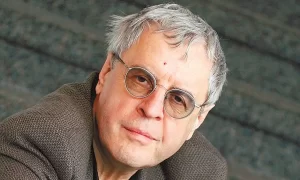In today’s poetry news round-up, we take a look at the life of the poet Charles Simic, who has died at the age of 84.
Charles Simic Dies Aged 84
 The Pulitzer Prize-winning poet Charles Simic has died at the age of 84. The Serbian-American poet’s death was confirmed on Monday, 9th January, by the executive editor of his publishing house.
The Pulitzer Prize-winning poet Charles Simic has died at the age of 84. The Serbian-American poet’s death was confirmed on Monday, 9th January, by the executive editor of his publishing house.
Born in 1938, Simic was the poet laureate in the US from 2007 to 2008. He was also awarded the Pulitzer prize in 1990 for his work “The World Doesn’t End”. His style of writing was awed by both critics and readers alike for its lyricism, tragic insight, economy and disruptive humour.
Born and raised in the former Yugoslavia, Simic didn’t begin writing in English until his mid-20s. Over the course of his long career, he published dozens of books, many of which were ranked amongst some of the greatest collections of poetry of his generation. His often bleak yet comic take on life was coloured by his formative years in a wartime country, which led to him saying, “The world is old; it is always old”. His poetry style favoured verses that were short and rather pointed, often with a jarring, and at times surprising, shift in the imagery and mood. This mirrored the randomness and cruelty that he had learned about as a child.
In addition to his Pulitzer Prize-winning book, he won a number of other awards over the years. He was a finalist for the National Book Award in 1996 for “Walking the Black Cat” He was a recipient of the Griffin poetry prize in 2005, with the judges describing him as a magician and a conjurer. He was fluent in a number of foreign languages and, as well as writing his own poetry, translated the works of other poets from Servian, French, Croatian, Slovenian and Macedonian.
Simic had two children with his fashion designer wife, Helene Dubin, who he married in 1964. In 1971 he became an American citizen, and in 1973, he became a member of the faculty at the University of New Hampshire, a position he remained in for decades.
His first book was published in 1967, “What the Grass Says”, followed by his second book “Somewhere Among Us a Stone is Taking Notes and Dismantling the Silence”, and soon he was writing and publishing at a rate of almost one book per year.
During an interview in 2013, he was quoted as saying,
“Of all the things ever said about poetry, the axiom that less is more has made the biggest and the most lasting impression on me,”
He also said that whilst he had written many short poems during his life, he wouldn’t really use the term “written”; it simply wasn’t the right phrase to describe how his poems came into being. His poems were things that came to him over time from the images and words that floated around in his head rather than him simply sitting down and writing.


You must register to comment. Log in or Register.